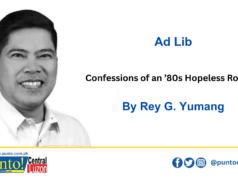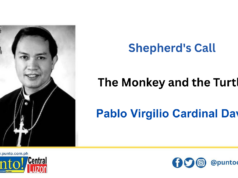IT WAS the worst of times, to partially lift from Charles Dickens’ Tale of Two Cities. It is now here and yonder.
Many Filipinos or nearly half of them, to be exact, are down in the dumps, according to the latest polls. About 48 percent, the SWS survey says, has reached the bottom of the barrel of hope. It’s the lowest ebb in the nation’s morale ever, the survey de points out.
That’s not just a problem; it’s a debilitating crisis. Imagine almost half of the people are depressed while the rest are either oppressed, suppressed or just plain pressed from all sides, to borrow from Paul’s description of his predicament in his mission to spread the gospel.
Why is this state of affairs?
There’s the COVID 19 pandemic, to begin with, the mother of all crises that now beset most Filipinos, the haves’ and the have-nots, mostly the latter for whom the term describing the bug problem as an existential crisis aptly applies in all respects, not just for lack of oxygen.
The pandemic has resulted in a huge economic devastation leading to the loss of jobs for millions, further worsening the poverty situation in the country and, inevitably hunger for a great portion of the populace.
The other crises, partly exposed or precipitated by the pandemic, is government’s apparent deficit in coping with the health crisis in terms of leadership, competence and cohesive direction.
No less than the ever voluble and refl exive Presidential Spokesman Harry Roque has obliquely referred to it when he compared the recent criticism of Vice President Leni Robredo to focusing on the glass half empty rather than on the glass half full. In other words, it’s just a matter of perspective, but the reality cannot be ignored. A doughnut may look good, but the hole in the middle is hard to ignore. Mene, mene tekel upharsim. Tinimbang ka ngunit kulang.
A case in point: the crisis is about health and the task force created to address it is mostly led by military men whose expertise is to shoot between the eyes, apart from shooting from the hips, not fight virus. For medical experts are practically sidelined, some of them not able to take the heat of the kitchen and left while others in the same field just zipped up to keep their jobs. For lack of a better term, we may call it Duque’s Density Syndrome. Prudence is the better part of valor.
There is also a crisis in priorities. What better example to show this jumbled sense of what comes first than the anti-terror bill considered as urgent by the President and a bill filed by the presidential son renaming the country’s biggest international airport in what looks like a sneaky, subtle historical revisionism.
Guess who’s probably behind the move? A crime needs a motive, so does a mockery. Money trail may be able to explain it as well.
As far as the anti-terror bill is concerned, the arguments of the proponents are torn down one by one by those who know better. Some groups have questioned its constitutionality. One retired Supreme Court justice, Vicente Mendoza, has called it vague and badly written. And Muslim leaders have decried its lack of sensibility and sensitivity to Muslims — felt as the unkindest cut of all– especially to the victims of the Marawi siege.
Of course, timing is everything. And the anti-terror bill is no joke. Robredo and other sectors have questioned the bill’s timing at a time when people are suffering a lot. Between a new franchise for the ABS-CBN to reinstate more credible, independent and transparent media and the anti-terror bill that is feared to terrorize innocent people, the choice is clear: public good is the first order of the day.
Roque even had the gall to say with a straight face, which is doubted by somebody in showbiz, that Duterte favors the 14-day detention in the bill which is blatantly opposed to what the Constitution provides. I didn’t think the Fuehrer frowned at the idea of ghettos for the non-Aryan in Europe in World War II. It’s amazing how power and pragmatism can trump principles as if there is no day of judgment. Former Supreme Court associate justice Antonio Carpio has given a hint of a sure-fire solution to our problems: drain the swamp in 2022.
Two years is what is left of Duterte’s term. Effectively, he has one year before he morphs into a lameduck. Between now and then, there is legacy to think about and with no vaccine in sight to calm down people’s anxiety and fear, aggravated by the other parts of a glass half-empty. Tough luck.
With all the crises besieging the nook and cranny of the republic, people are just tired of the daily statistics churned out day in and day out by the COVID task force. Roque ran berserk in his first day in office as reinstated spox, blaming the spike in virus infection to alleged lack of Filipino discipline. That was then when cases were still below 10,000. We’re now at about 35,000 cases and counting and Roque, cornered by his own glib propaganda, has found another reason for the resurgence: it’s the testing, stupid. Even a comedian in the Senate is uncomfortable by the uncurbed curve.
The government can get its acts together and, with the amount of time left, can still turn around the country’s continuous drift towards hopelessness. Historians have included fatalism in the list of Filipino bad habits, including the mañana, a relative of a fat general’s propensity for partying while people are sick in the stomach due to hunger and lack of real concern. Shades of Nero playing the fiddle while Rome was in smoke.
Fatalism and pessimism are not a good mix. When Dickens wrote the Tale of Two Cities, the French Revolution was turning France upside down.
Those who don’t remember history, Santayana warned, are condemned to repeat it.





